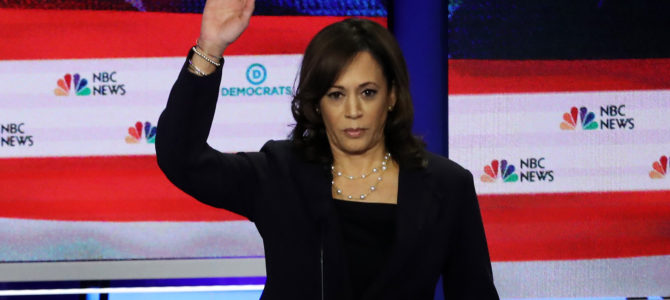
Sen. Kamala Harris, once considered a 2020 presidential Democratic frontrunner, ended her bid for the nomination on Tuesday, citing a lack of funds. “I’m not a billionaire. I can’t fund my own campaign,” she wrote in an email to supporters. “And as the campaign has gone on, it’s become harder and harder to raise the money we need to compete.”
Harris becomes the second major candidate to drop out of the primary race before Iowa, joining Beto O’Rourke, who bowed out last month after failing to gain significant support and running out of money.
Why did Harris crash? Three reasons immediately come to mind: she got too much undeserved attention too early, she’s a cop with a record that doesn’t appeal to Democratic primary voters, and she was no match for Rep. Tulsi Gabbard, who basically killed her campaign on live TV by exposing Harris as a hypocrite.
1. Harris Wasn’t the Consensus Candidate the Media Thought She Was
Like O’Rourke, Harris got too much attention too early on from media and beltway insiders, who saw her as a kind of totemic candidate who could pull together all the disparate strands of the Democratic Party and re-create the Obama coalition. She was a black woman, an experienced prosecutor who had won a Senate seat in California, a pragmatic liberal with positions just to the left of Joe Biden. The establishment would accept her and, with some strategic pandering, so would the left-wing base—or so went the conventional wisdom.
But she never polled higher than about 15 percent. That was back in July after she attacked Biden on school busing in the first Democratic debate, a position she later walked back, opening her up to charges of cynicism and insincerity. Her numbers plummeted after that, and since early August she hasn’t polled in the double digits. In recent weeks her support dipped below 4 percent.
That’s another parallel with O’Rourke, who despite fawning media coverage never attracted many actual supporters. Consider that a year ago Harris and O’Rourke were being touted as number one and two in the Democratic field, despite trailing far behind both Biden and Sen. Bernie Sanders.
51 weeks ago pic.twitter.com/BXhRgj3qAA
— Derek Thompson (@DKThomp) December 3, 2019
That both were so feted by the media and Twitter yet burned out so early suggests that they were molding their campaigns around positive coverage and viral moments instead of understanding a complex Democratic field and picking a viable lane with a pathway to the nomination.
2. Kamala Is A Cop
Why did Harris fail to attract support? Maybe it’s because she never became the candidate the media establishment thought she was and instead took every opportunity to showcase her worst instincts, like her cringe-inducing “foodie president” act, or trying to get President Trump banned from Twitter.
Speaking of bans, as my colleague David Marcus noted back in January, Harris marked herself out early on as queen of the ban: “Along with banning private health insurance, Harris also wants to ban for-profit colleges, assault weapons, fossil fuels, personal cars, and presumably members of the Knights of Columbus serving as federal judges.”
Presumably, Harris thought a draconian approach to such things would please the Democratic Party’s left-wing base, whom she knew would be naturally suspicious of her. But it was a bad look for a candidate trying to gloss over her record as a tough, no-nonsense prosecutor who, for example, put more than 1,500 people in jail for smoking weed—and then laughed about it.
3. Tulsi Is A Cop Killer
That brings us to Gabbard. More than any other candidate, Gabbard’s mauling of Harris in the debates exposed not just Harris’s hypocrisy but also her prickliness and general unlikability.
When Gabbard tore into Harris for her record as California’s attorney general during a debate in late July—for jailing marijuana users, blocking evidence than would have freed a man on death row, and keeping people in prison to use them as cheap labor for the state of California—a visibly flustered Harris responded by saying she was proud of her record and that actually making decisions as a prosecutor is a lot harder than making “fancy speeches.”
WATCH: Tulsi Gabbard tears into Kamala Harris' tough-on-crime record as California Attorney General. #DemDebate2 pic.twitter.com/Bw8iFW5wgI
— America Rising (@AmericaRising) August 1, 2019
The exchange would come to epitomize a candidacy that was obviously twisting in the wind. By the time Harris reversed her position on marijuana legalization and mandatory sentencing reform, it was obvious that she had no real principles and would, like Hillary Clinton, change her views to whatever she thought would advantage her politically.
That’s what really killed her campaign. 2016 should have taught our political class and media elites that voters hate that sort of thing. Trump’s victory in the GOP primary and against Clinton in the general was driven above all by voters’ disgust with politics as usual and a deep aversion to precisely the kind of cynical pandering that marked Harris’s entire campaign.









